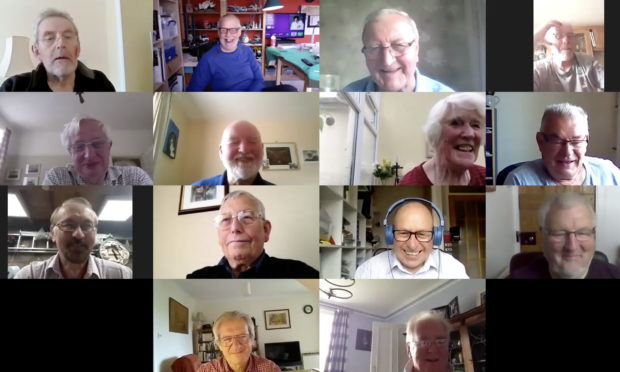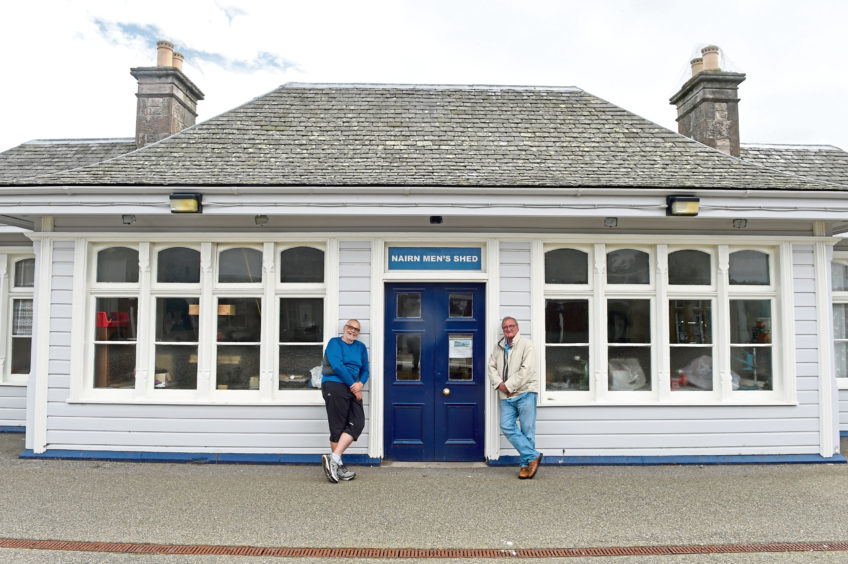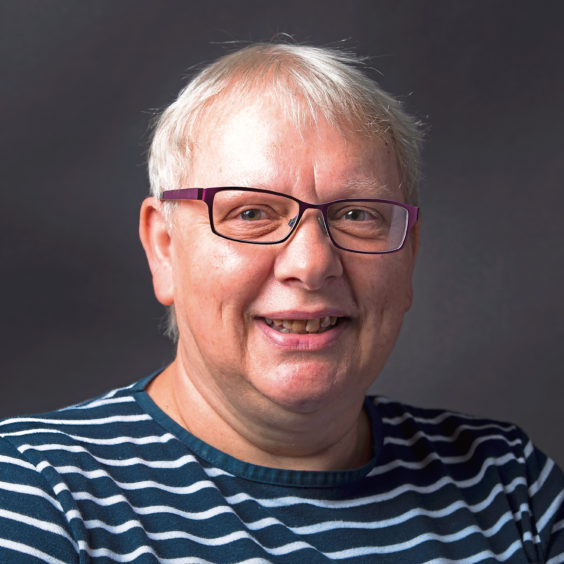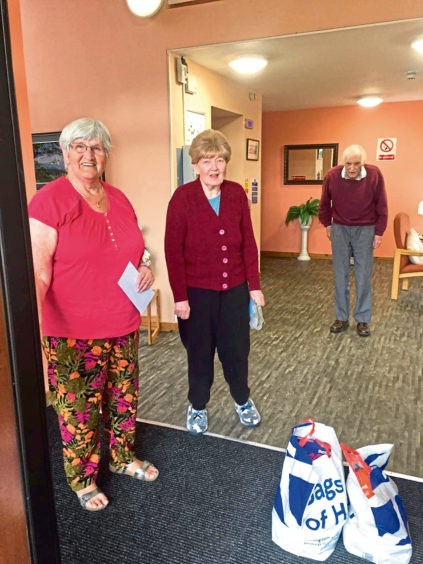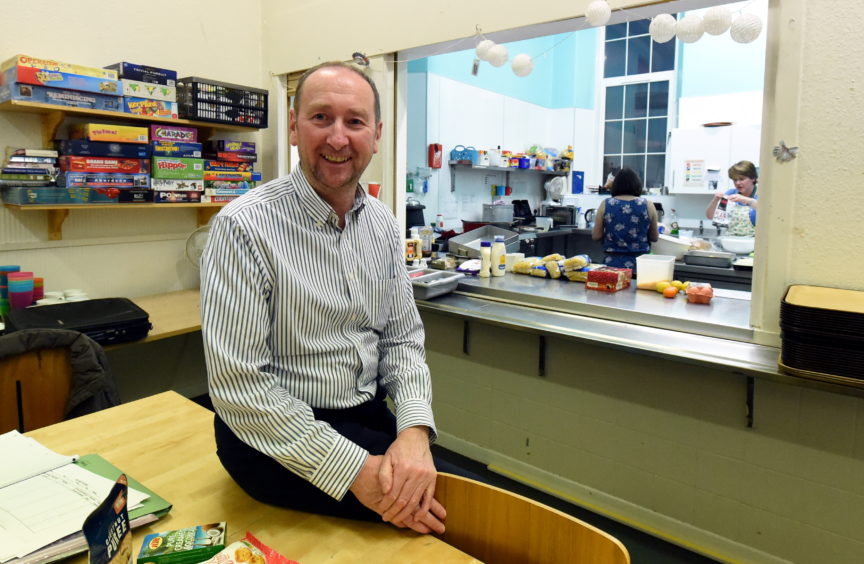There’s a brief pause, then brows are furrowed and heads bowed in concentration.
Sketch pencils dance across the paper, before each participant gingerly holds their work up to the screen.
They may not be meeting in person, but there’s no excuse for missing art group – even during a pandemic.
“It’s a thriving little art group, and we’ve been trying to make it as fun as possible,” says John Rushforth. “We’ve used modern technology as best we can.”
John is at the helm of the Nairn Men’s Shed, and is leading the way for its 32 members. The group has been in existence for nearly four years, and the average age is over 70.
“I’m one of the youngest, at 67,” jokes John, who worked for the Care Inspectorate before retirement.
“Most of our members are well into their 70s and have been shielding during lockdown.”
Nairn Men’s Shed is just one out of hundreds of charities in the region that have been forced to adapt in the face of Covid-19.
At a time when many families are tightening purse strings, where does that leave charities?
Alongside financial difficulties, charities are also experiencing a surge in demand.
We spoke with those who have been left with no choice but to keep going in order to help the most vulnerable, and discovered a heartening determination.
Nairn Men’s Shed
The mens’s shed movement originated in Australia, as a way of improving the health and wellbeing of older men. And there are now more than 500 groups in the UK, although Nairn Men’s Shed can boast it is the first such community group in the country to have premises at an active railway station.
Their meetings are at Nairn train station, where the group has renovated a former waiting room.
Members normally meet five days a week, but have swapped their normal venue for virtual hangouts.
“Men’s sheds has always been about the reduction of social isolation,” explains John.
“How do you destroy us? Put us into lockdown.
“The group started with six of us, we used to sit in the local golf club and dream. That dream became a reality, and we aren’t going to let it crumble.”
John has even offered Zoom coaching to make sure everyone can get online.
“Some of our members may not be on the ball with technology, so I’ve been talking people through it on the telephone,” he says.
“We have people over the age of 80 who have been able to get online.
“We’ve worked really hard to try to combat social isolation, but it has been damned difficult.
“I’ve worked in social care since I was 19, so I understand social isolation exceedingly well. I know what it does to people.”
Although the group has stayed in touch thanks to technology, John believes it can only get them so far.
“We desperately miss the reality of meeting up together,” he says.
“If you’re sitting in the room, there will be a conversation in one corner and a different chat in another. Even if you’re not joining in, you can earwig. The real value lies in sitting around, chatting and having banter.
“I have seen guys turn up who feel a bit down perhaps. And before long, they are bouncing around and chatting to everyone.
“The real challenge will come with trying to get that back. We’re confident that new members will be joining, because their families have realised how isolated they are in lockdown.
“Men’s sheds isn’t day care, it is not led by anyone other than the members.
“It is good fun.”
CLAN cancer support
How do you handle a cancer diagnosis on top of a pandemic?
CLAN Cancer Support has offered emotional and practical support for 35 years. It has seen significant demand for telephone support, counselling and online services during lockdown. It has also been forced to cancel many of its vital fundraising events, leading to a major funding deficit.
So CLAN has launched its Here For You campaign, in a bid to ensure it can continue to provide that vital help and advice.
Karen Scott is the cancer support area services manager for Orkney, and believes people have coped remarkably well.
“We closed the CLAN Kirkwall centre to clients on March 16, and began our telephone support service,” she said.
“Our clients have told us how much they have appreciated both the calls and the online therapy classes which included massage, reflexology and mindfulness.
“Within that first two months, we made around 100 support calls locally, and we also kept in touch with our wonderful volunteers.
“Our clients’ needs and their adaptation to lockdown have brought challenges and for many, they have managed better than they would have imagined.
“A new diagnosis for anyone may be the most challenging time they have experienced. Adding Covid-19 to this and all it entails can be scary for many.
“We are able to support people in this position and direct them to our online resource centre which offers additional practical advice.”
Fiona Fernie, CLAN’s head of income generation and business development, is hopeful that people will get behind the charity.
“We took the decision to postpone our key fundraising events, and close our charity shops to ensure the safety of our supporters, volunteers and staff,” she said.
“Without the income from our shops and fundraising events, we cannot sustain the provision of our professional cancer support in the longer term.
“Cancer is not going away and our services are more vital than ever. We want to ensure we are here to support those who need us most.
“That is why we are asking the people and communities of the north and north-east of Scotland to get behind CLAN and give whatever they can, to allow us to continue offering these vital, professional cancer support services.
“Cancer changes everything, and so has the coronavirus. But with support, we can give people affected by cancer the hope, reassurance and support they so desperately need.”
Badenoch & Strathspey Community Transport
Lockdown can prove even more challenging if you are faced with geographical isolation.
This is particularly the case in more rural areas of Scotland, including Badenoch and Strathspey in the Highlands.
There is no danger of vulnerable people slipping through the net though, not if one charity has anything to do with it.
Badenoch & Strathspey Community Transport operates one of the most successful community transport schemes in the country, thanks to volunteer drivers and telephonists.
The service is aimed at those who cannot get out and about easily, and can mean the difference between socialising and staying trapped indoors.
It previously offered a community car scheme, door-to-door bus service, assisted shopping service and transport to social events.
Covid-19 has seen these lifelines come to a stop overnight, but the charity has continued to run after making some changes.
It is perhaps just as well, because it has seen a huge surge in demand.
Maggie Lawson MBE, who is development manager for the charity, says the challenge has been monumental.
“We’ve never faced anything like this before, not in our history,” she says.
“We had to think very quickly. So we set up befriending, where a team of volunteers give people a phone.
“Using the phone is so important, even if we’re just asking someone if they’re OK for food and prescriptions.
“Lockdown has had a huge effect on people’s mental health, and we know that many people are too frightened to go out.
“All they’ve had is phone calls from our volunteers, and they are just so grateful to hear a friendly voice.
“Now, as families go back to work, there may be even less contact for older people. So we are expecting the requests to build up again.”
Maggie believes that the next generation has stepped in, and contributed to a humbling community effort.
“We normally have 180 volunteers, but so many of them are older people who are shielding,” she says.
“This has been an opportunity to call on younger people.
“We made sure that every child had an Easter egg in Aviemore.
“People delivered on bikes or walked – it was amazing.
“I think this pandemic has exposed humanity. The community spirit has totally changed for the better.
“Each village and town has got a Covid response team, we are all working together. That needs to continue.”
Aberdeen Cyrenians
For Aberdeen Cyrenians, the pandemic has led to the charity launching new services, including AC2U.
“AC2U is an emergency response to support the most vulnerable people. We help those who are self-isolating who have no one else to support them, prioritising those who are homeless, at risk of homelessness or who have multiple complex needs,” says Mike Burns, who is chief executive of the charity.
He predicts that demand on the charity is set to increase even further.
“Aberdeen Cyrenians has worked with the problems of society and people’s long-term mental health for 52 years,” says Mike.
“We predict that there will be many more people to knock on our door in the weeks ahead.
“Around 7,000 universal credit applications were made in Aberdeen alone.
“As a charity, we must rise to the challenge, and I am immensely proud of how my staff have responded.
“We are seriously concerned for autumn and Christmas, when we receive most of our donations – perhaps because that is when homelessness becomes real. That is when people reach into their pockets, but a lot of those people are facing unemployment.
“We’re looking at a bleak winter.”
To find out more about Nairn Men’s Shed, visit their Facebook page.
You can learn about CLAN at www.clanhouse.org
To read more about Badenoch & Strathspey Community Transport Scheme, see www.ct4u.co.uk
For Aberdeen Cyrenians go to www.aberdeen-cyrenians.org
